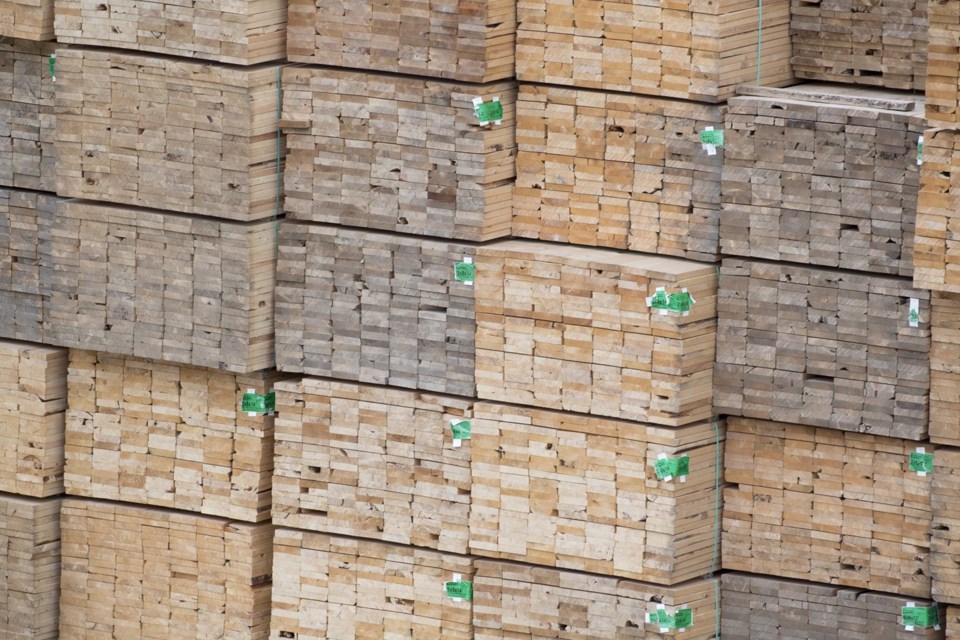U.S. President Donald Trump’s shifting trade policies are creating uncertainty for the Canadian forestry industry.
Sean McLaren, president and chief executive of West Fraser Timber Co. Ltd., says the potential inflationary effects of tariffs could weigh on future demand.
"Looking forward, we see considerable macroeconomic uncertainty, particularly stemming from the U.S. administration's evolving tariff policies," he said on a conference call Wednesday with financial analysts to discuss the forestry company's latest results. He said the company is planning for multiple scenarios.
U.S. tariffs on Canadian and Mexican imports went ahead on March 4, but were followed shortly after by an exemption on goods subject to the free trade agreement between Canada, the U.S. and Mexico.
However, Trump wants to increase domestic lumber production and has directed the U.S. Commerce Department to investigate the potential harms lumber imports could pose to national security. The investigation will include looking at the extent to which domestic production of timber and lumber can meet domestic demand, and will look at whether measures like tariffs or quotas "are necessary to protect national security."
Trump also signed a separate order to possibly increase supplies of timber and lumber and possibly lower housing and construction costs.
The department is also conducting its sixth administrative review of softwood lumber duties. RBC analyst Matthew McKellar said in a note Tuesday that if the department’s recent preliminary determination from that review goes ahead, countervailing duty rates will more than double for most producers.
He said in a separate note that the outlook for the paper and forest products industry is highly uncertain when it comes to demand due to the rapidly evolving trade backdrop.
"All of this uncertainty is bad for business," said Derek Nighbor, president and CEO of Forest Products Association of Canada.
Between likely higher duties on the way, the executive orders and the potential weight of tariffs on the economy, there's a lot for companies to deal with, said Nighbor. A big part of the industry for Canadian lumber is tied to housing, he explained.
"When we hear talk of a possible recession ... that's not good for consumer confidence, and so that's not good for our industry," he said.
Nighbor said the U.S. gets about 70 per cent of the lumber it uses domestically, including from Canadian companies with U.S. operations. Around a quarter is imported from Canada, and the rest from other countries, mainly Europe.
"We have these decades-long relationships and integrated supply chains," he said. Builders in the U.S. also like Canadian lumber because it has different properties, he added.
"You'd prefer to frame a house with Canadian lumber over Southern yellow pine ... because it's lighter and it's stronger."
Nighbor added that any impact on Canadian lumber companies will also affect pulp and paper: "We've got all of these downstream industries that depend on those inputs."
McKellar noted that though higher duties would have an impact on the industry, companies like West Fraser, Interfor and Canfor are geographically diverse with more capacity in the U.S. than Canada, meaning potential softening of demand could be the bigger concern.
In its Feb. 13 earnings release, Interfor said only about a quarter of its total lumber production is exported from Canada to the U.S., while about 60 per cent of its total lumber is produced and sold within the U.S.
"Over the mid-term, Canadian lumber is expected to remain a key source of supply to meet U.S. needs, as growth in U.S. lumber manufacturing capacity will likely be limited by labour constraints, lengthy equipment lead-times and extended project ramp-up schedules," the company said.
In an earnings release March 6, Canfor said it's well-positioned to navigate the challenges posed by tariffs and duties, with diversified operations including in the U.S.
"However, actual and potential tariffs do present challenges for the company’s Canadian operations, and, as result, the company is continuing its strategy of refocusing those products on domestic markets, particularly in Western Canada, and strengthening its presence in offshore markets," the company said.
West Fraser's McLaren said the company is "split evenly on (its) major products between the two countries."
"You can see where our investments have been as we strengthened and positioned our assets in the U.S., and we have a good Canadian platform that we think competes well in Canada. So I think all of those things ... gives us lots of options to navigate through whatever comes," he said.
Nighbor said he hopes the trade dispute will spark more interest from the government in supporting domestic production as global demand continues to grow.
"At the end of the day, any company is going to make a decision on where they're able to operate best and at a lower cost or a more competitive cost. And this has been one of the issues in Canada," he said.
"This is where federal and provincial governments really need to get together to think about, how can we sustain and grow this industry?"
— With files from The Associated Press
This report by The Canadian Press was first published April 23, 2025.
Companies in this story: (TSX:WFG)
Rosa Saba, The Canadian Press



